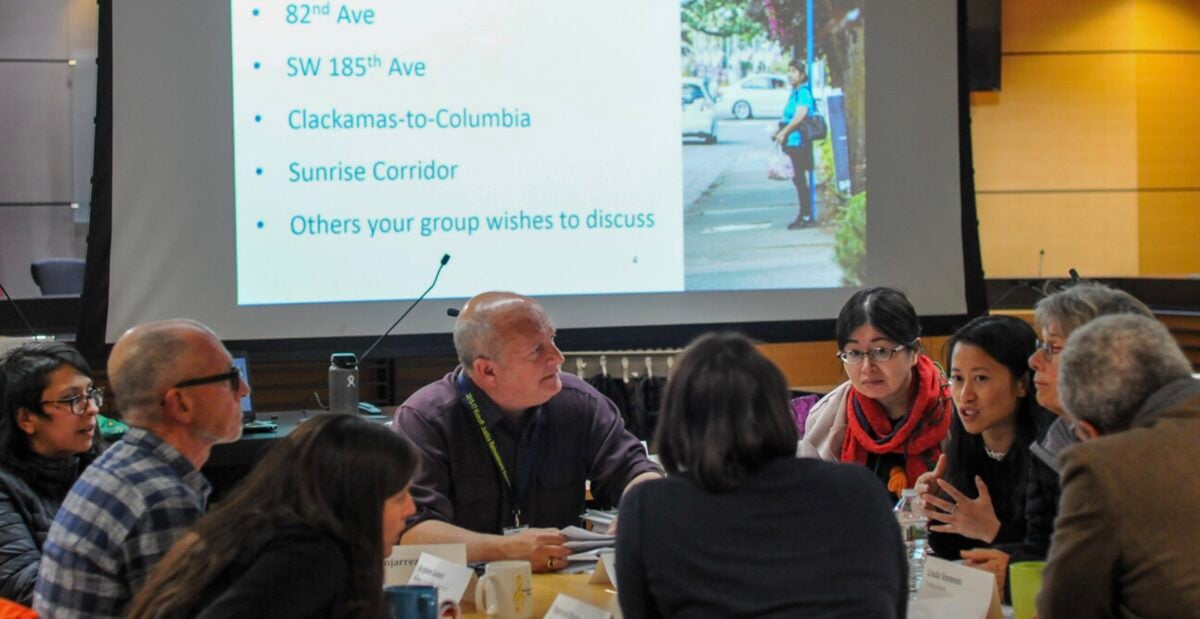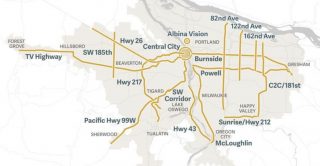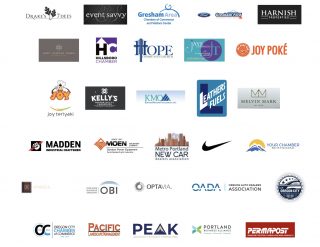
(Photo: Jonathan Maus/BikePortland)
In my memory there has never been a more divisive issue inside Portland transportation reform activist circles than Metro’s transportation investment measure.

The package of proposed investments has been hailed by some as an exciting opportunity and panned by others as a missed opportunity. 26-218 would raise $5 billion (and leverage a potential $2 billion more in federal funds) for projects and programs with a 0.75% payroll tax (to begin in 2022) on the 9% of businesses in the region with 26 or more employees. And while you might think billions of dollars for transportation would be enough to make skeptics overlook quibbles and get on the bus with a “yes” vote, this measure is under a real threat of failing as loud “nos” are being heard from both usual and unusual voices.
Why people like this measure
26-218 is unprecedented as much for what it is as for how it came together. Not only would it thrust Metro into a much more significant role as a steward of our regional transportation network (combining their already influential role in planning with real pursestrings), the package was put together by a broad coalition of racial, social, and environmental justice organizations.
Many people think this measure is a chance to make good on our promises and pledges to do better around racial justice and equity and to have the usual players step aside and let groups who work with Black, Indigenous and other people of color lead the way to a more fair future. The Getting There Together Coalition fully endorses this measure not just because they believe it helps their communities, but because they were at the table when it was created.
26-218 would invest hundreds of millions into deadly arterials like Tualatin Valley Highway and 82nd Avenue that plague neighborhoods where our region’s low-income and communities of color live and work. Speaking of work, supporters of the measure say the 150 projects will create over 37,000 good-paying jobs. It would also provide full funding for the City of Portland to create a network of protected bike lanes downtown. Beyond infrastructure, the measure would pump $1 billion into vital programs including free TriMet youth pass for all students in the region.
Advertisement
With major funding that will improve bicycling, walking and transit, it’s not hard get excited about the potential. We desperately need more investment in transportation and historically marginalized groups need to be the ones telling us where and how to do it. This measure does both those things.
But some folks see a devil in the details.
Why people don’t like this measure
Of course there is a huge pushback from a big business and anti-tax group because this is a new tax and they don’t trust Metro’s intentions. I won’t address concerns of those groups here.

What’s more revealing is how 26-218 is opposed by media (it’s the only local measure the Willamette Week urges a “no” vote on) and some people in the progressive flank of the transportation reform ecosystem.
The most notable opposition is from economist and City Observatory Publisher Joe Cortright. Cortright has earned respect in many local transportation circles for his dedicated opposition to freeway mega-projects like the Columbia River Crossing and the I-5 Rose Quarter project. He’s an ardent critic of the Oregon Department of Transportation and an advocate for cities where it’s easy to bike walk and take transit.
That’s why many eyebrows were raised when Cortright published a scathing takedown of 26-218 back in August. His nine bullet points allege (among other things) that the measure will “do nothing” to lower greenhouse gas emissions, has a clumsy revenue source that subsidizes drivers, doesn’t take Covid-19 realities into account, and is “founded on a highway-oriented concept of corridors, rather than a more sensible approach emphasizing walkable centers and main streets.”
And then there’s the SW Corridor light rail project — the biggest-ticket item in the entire package at nearly $1 billion. TriMet’s new MAX line has lots of detractors who feel the design is way too car-centric, won’t move the needle for climate change or transit ridership, and that bus rapid transit would be a better investment. One trusted source told me they believe the entire measure was crafted solely to ensure SW Corridor funding.
These are all serious critiques. But you know that saying about perfect being the enemy of the good?
Perfection and the public good
Few people know more about Metro and transportation than Chris Smith. A trusted activist currently in a tight race for a seat on Metro Council, Smith supports the measure while acknowledging its shortcomings. Smith’s detailed statement says 26-218 “fails” to reduce greenhouse gas emissions and that targeting business payroll is “not an ideal tax”. Even so, “It’s a useful and probably politically necessary first step,” Smith wrote.
Advertisement
During a City Club debate on Tuesday, Smith re-iterated his support saying, “We have finally reached a broad consensus on the project list, and I think it’s time to move forward.”
Milwaukie Mayor Mark Gamba has pinned his political hopes (including a recent run for Congress) on his fight against climate change. Given that Metro’s own modeling shows 26-218 might not result in greenhouse gas emissions reductions, I was curious about his stance. “I support it,” Gamba shared via email this week. “It’s far from perfect, but it moves the next light rail line forward, it tests some concepts for improving bus service, and it pretty dramatically increases safety for walking and biking on all of the corridors which are some of the worst in the region. I think it could have done a lot more to improve bus service, it could have fixed some big gaps in bike infrastructure. But it is a start.”
At a time when centrism is a political liability and the extremes hold so much sway, a moderate measure like 26-218 faces a serious challenge at the ballot box.
How will you vote? Help others decide by sharing your opinion in the comments.
— Jonathan Maus: (503) 706-8804, @jonathan_maus on Twitter and jonathan@bikeportland.org
— Get our headlines delivered to your inbox.
— Support this independent community media outlet with a one-time contribution or monthly subscription.
